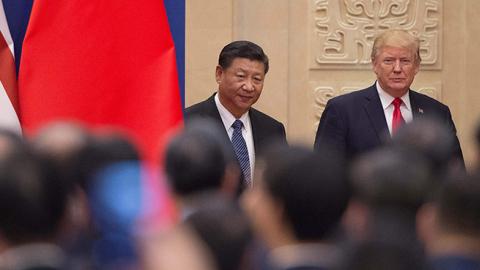When Donald Trump first threatened a trade war with China shortly after assuming the presidency, the consensus around the world was that it was typical bluff and bluster. As per the common wisdom, authoritarian political-economies are far more resilient when it comes to absorbing economic pain. In contrast, democratic leaders must balance too many conflicting whims and demands. In a battle of presidential and national will, any tough action by Trump would end in backdown and humiliation.
It is looking like most economists and political scientists were incorrect. With just weeks away before the U.S. raises tariffs on about $275 billion worth of Chinese imports from 10 per cent to 25 per cent on March 1, the domestic dynamics in the U.S. and China respectively are the reverse of what most expected.
In the U.S., much of the administration, Congress, Democrats, business groups and even households do not simply want any trade-war busting deal. The perception of China in strategic and economic terms has turned negative, and decisively so. Most Americans want an agreement which will properly address Chinese malfeasance such as intellectual property theft and wind back the enormous subsidies and other advantages given to Chinese state-owned firms and national champions. They have taken their time to come to this position, but the steadfastness of democracies after they have made up their mind is often underestimated. Should Trump craft a deal which only reduces the current account deficit with China and leaves those other matters untouched, the President will endure enormous damage to his personal reputation and political standing.
Indeed, the pressure on Trump to arrive at a comprehensive agreement that goes beyond evening up the current account numbers is demonstrated by the fact that U.S. Trade Representative Robert Lighthizer has taken the lead in negotiations from relative economic doves such as Treasury Secretary Steven Mnuchin and Commerce Secretary Wilbur Ross.
Lighthizer is at the forefront of pushing for a fundamental reorganization of the U.S.-China economic relationship. This includes verifiable and punitive measures to reduce Chinese IP theft and decoupling supply chains from China in critical sectors that will define technological dominance, such as 5G and artificial intelligence. According to Lighthizer, China has bitten the hand which fed it ever since it entered the World Trade Organisation in 2001. Beijing has used participation in global markets to enhance its geo-strategic and geo-economic objectives at the expense of more trusting liberal democracies through gaming the system and even outright cheating. The emerging national zeitgeist in the U.S. is that such naivety must end now.
In China, Xi confronts a very different dynamic. The public criticism leveled against the “Chairman of Everything” is considerable and the pressure is on him to forge a deal — any deal — to end the pain.
Xi has been accused of hubris, overreach and miscalculation. Once the boastful design for future technological dominance, Xi now rarely refers to his “Made in China 2025” blueprint in his public commentary. Officials have been instructed to reduce emphasis on the flagship Belt and Road Initiative. Xi’s predecessors did well because they avoided picking fights with the U.S. and other powers. The current leader has abandoned that rulebook.
China is stressed and flummoxed. Beijing has been sending scores of officials to hammer out a possible deal. It has been reported that Trump will meet Xi in late February. There may be progress, and even announcement of ad hoc deals to further delay the jump in tariffs on Chinese goods due after March 1. Nevertheless, we should temper expectations of any grand agreement between the two sides.
The problem is the characteristics of China’s authoritarian political system, which have become more severe under the Xi era. The Communist Party promises perpetual economic growth and a return to strategic pre-eminence to justify its exclusive hold on power.
Given low labor productivity and declining capital and total factor productivity (output not explained by labor or capital inputs), dominating external markets for Chinese products and services is the only alternative. To achieve strategic pre-eminence, Beijing relies on developing even more dominant SOEs and national champions to enhance national power into the future. To accelerate these developments, IP theft has become industrial policy.
In its authoritarian political economy, Beijing could force Chinese companies to temporarily purchase more U.S. goods to reduce the trade deficit. It could allow greater access to the growing domestic services and financial markets for American firms.
However, China cannot offer the structural reforms that the U.S. is after as that would endanger the role and standing of the Communist Party. Xi can remove “Made in China 2025” and even the BRI from official lexicon but China cannot easily change the way it interacts with the world.
To be sure, Trump has not made it easy for other countries to back him even if they agree about egregious Chinese economic behavior. He instinctively bilateralizes every issue and cares little about blind-sighting allies in the process. For that, Australia, the European Union and Japan should complain.
But the new normal is growing and deep tension between the two largest economies in the world — and dislike for Trump’s style — cannot be equated with longstanding Chinese gaming and undermining of the system. Rather than standing to one side, other liberal-democratic economies must soon decide how seriously they take their stated commitment to fair competition and a rules-based global order.


















